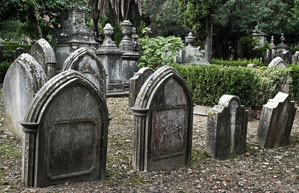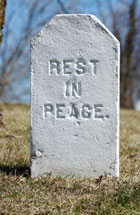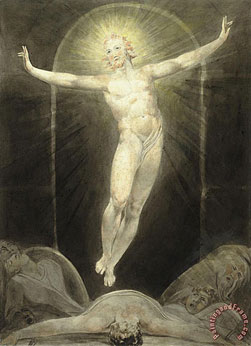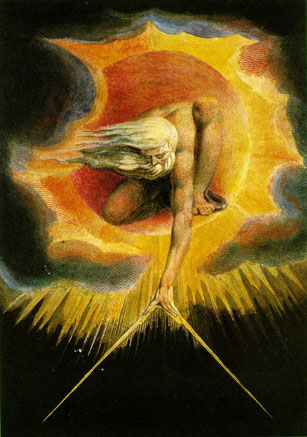
Bury the Dead by Deborah Beach Giordano
The Living and the Dead
“Let the dead bury their dead.”
It’s a well-known quote, used far and wide, even by people who have no idea Who said it — or why. And it is the “why” that is the sticking point. At first reading it seems callous, cold-hearted; who would begrudge a fellow the opportunity to attend his father’s funeral? Too, Jesus’ words appear to counter the commandment: “honor your father and mother,” which would surely include providing a decent burial and appropriate religious rites.
 But I wonder…
But I wonder…
How do we know that the man’s father was dead?
Perhaps his father was still alive and kicking and the man simply wanted to go away and think about Jesus’ offer. Or maybe he just wanted to go away; maybe what Jesus asked of him was more than he felt he could do.
Or maybe the Lord understood exactly what was holding the fellow back. Perhaps in this case the dead father needed to be left to the dead — shut off from the living, quietly “sleeping with his ancestors,” as the Torah describes it. Perhaps the son needed to walk away with Jesus, leaving the dead to the dead, and claim his own place among the living.
For it can happen that, even if the body is cold — bound up in a shroud, sealed in a tomb, long mouldering in the grave — the dead can exert a powerful hold over the living.
Blessings, curses, love, hate, contempt, criticism, resentment … these and more can live on long after the speaker has died. The dead can shape and manipulate those who remain — sometimes more powerfully than when they were alive, for there can be no argument or refutation, no apologies or retractions: it is as if the words were written in stone, impossible to eradicate.
Voices from Beyond
Sometimes it is hard to tell who was buried and who is as good as dead but still above ground: the girl who dreamed of a large family now an aged, lonely spinster because her family insisted that every man she dated was “not quite right;” the child with the beautiful voice who only sings in the shower after being dismissed as a “show off;” the young man standing on the precipice, pushed to the edge by his father’s derision of “queers.”
Oh, they are many, those who are wrapped up with the dead, and their stories run from the merely sad to the heartbreakingly tragic. Some have embraced the direst predictions; becoming the “slut,” the “layabout,” the “failure,” the “worthless so and so,” — and thus, in a terrible way succumbing to the power of the deceased: “mother was always right.”
For the love of God, let the dead bury the dead! Let us bless them, and release them; cherishing what was good, and giving over to God what was troublesome.
The Undead
 There is a tradition that claims that the dead remain stuck in a sort of limbo if they have unfinished business with the living: they are neither here nor There. Held fast by ties of hatred, anger, resentment — even of love, they remain bound to those who will not let them go.
There is a tradition that claims that the dead remain stuck in a sort of limbo if they have unfinished business with the living: they are neither here nor There. Held fast by ties of hatred, anger, resentment — even of love, they remain bound to those who will not let them go.
That belief may be an inspired metaphor; a symbolic representation of the long-lasting influence of those who have died. As long as we continue to be affected by their hateful and hurtful words, obeying as if they were orders from an Absolute Authority, we are connected to those speakers — and they to us — as if by an invisible chain.
It is a work of mercy, then, to put to rest whatever is keeping these souls attached to this world, especially when it is a continuation of pain and suffering for both parties. To bury the dead is to accept and affirm that their power is no more; their strength is gone, their words can no longer hurt or tear down. To bury the dead is to break the chains that bind you: it is to let them go, and to free yourself to live fully and unencumbered.
Awakening
It is easy enough to say, “Let the dead bury the dead:” let go of what is not life-giving, free yourself from all that crushes your hopes, belittles your dreams, and destroys your confidence. But it can be hard to find the still-shining spark beneath the accumulated dust after many years of erosion. The first step is to have faith that it is there. Seek and you shall find.
 Look at your hands, touch your face, feel the ground beneath your feet, breathe deep, feel your heart beat: you are alive. You were brought forth through God’s wondrous design. You are filled with divine potential, with strength, with power — astonishing, sacred power. You are a profoundly loved, glorious child of the Holy Inexpressible.
Look at your hands, touch your face, feel the ground beneath your feet, breathe deep, feel your heart beat: you are alive. You were brought forth through God’s wondrous design. You are filled with divine potential, with strength, with power — astonishing, sacred power. You are a profoundly loved, glorious child of the Holy Inexpressible.
Yes, you.
Imagine that.
Imagine what it is like to live accordingly.
And Then…?
“What was lost was found.”
~ from the parable of the lost sheep
We are not told how the man responded to Jesus’ words. Did he shake his head in confusion as he walked away, or stand and stare as the Lord continued on His way? Or did he blink his eyes in sudden comprehension, as if scales had fallen from his eyes? Did he understand the power of the dead to drag him into the depths and steal his very life? Perhaps in that moment — too sacred and personal to be included in the Gospel — the man recognized his blessed and holy status: not as a child of his father, but of the divinely loving Father in heaven.

Maybe this seemingly-minor interaction was in fact another version of the Lazarus event: a man called forth from the grave, blinking in astonishment; reinvigorated, renewed, rejoicing. What had been lost was restored.
Perhaps this was a new beginning — as it can be for any of us at any time: whenever we recognize our nature as the beloved, grace-filled children of God. And I believe this was the case, because Jesus did not only advise the man to leave the dead to the dead, but commissioned him, as well:
“As for you, go and proclaim the kingdom of God.”
May we be aware of our nature and joyful in our lives, ever-proclaiming the glorious kingdom and kindness of God.
May Christ’s grace and healing love abound,
Deborah ✝
Suggested Spiritual Exercise
Recognize and (re)affirm your nature as a beloved child of God in all that you do and say, all that you hope for and believe in.
“As for you, go and proclaim the kingdom of God.”
Prayer to Release the Dead (To Restore Our Health)
All-Gracious God, in You all desires are known; You know the secrets of our hearts and the suffering of our souls. You know the harm and hurts we have endured. You know how hard this is for us; empower and inspire us to pray sincerely and to believe — where we have not yet seen.
Merciful Creator, into Your hands we commend [name] in the sure and certain hope of Your transforming love; to repair what is broken, to heal what is wounded, to comfort the hurting, and bring peace and tranquility where there is sorrow and distress.
Just Judge, inspire in us a quiet confidence that Your Will shall be done, that justice will prevail. Deliver us from evil; protect us from the temptations of revenge and resentment. Guide us in the way of peace.
O Compassionate One, whose son Jesus Christ destroyed death, grant that all hatred and cruelty, all hopelessness and despair be destroyed in us that we might live fully as Your glorious, radiant children. Break every chain that binds us, lift us up into Your light.
We come to You, Source of Every Blessing, ready to be renewed and refreshed, restored to full and joy-full life through Jesus Christ our Lord.
Amen.